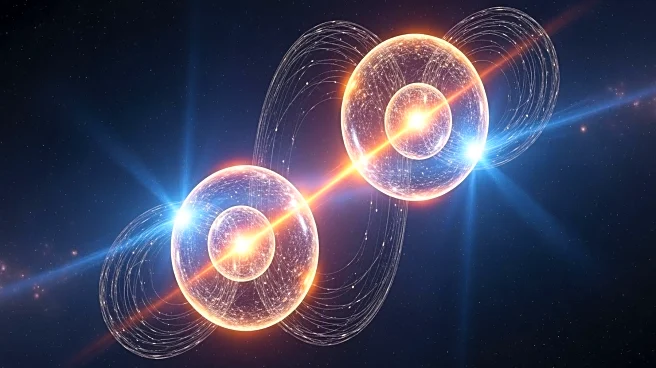What's Happening?
An international collaboration between scientists in the U.S. and Japan has produced a significant joint analysis on neutrino oscillation, published in Nature. The study combines data from the T2K collaboration in Japan and the NOvA
experiment in the U.S., involving 810 scientists and engineers from 124 institutions across 23 countries. Neutrinos, known as ghost particles, are subatomic particles with no charge and very little mass, and they have been a subject of intense study due to their mysterious properties. The analysis aimed to understand the mass composition of neutrinos and the matter-antimatter asymmetry of the universe. Despite not providing definitive answers, the study offers pathways for future research and highlights the potential differences in behavior between neutrinos and antineutrinos.
Why It's Important?
The study of neutrinos is crucial for understanding fundamental aspects of the universe, including why matter exists in its current form. Neutrinos are key to unraveling the mystery of the matter-antimatter asymmetry, which could explain why the universe is predominantly composed of matter. The collaboration represents a significant step in international scientific cooperation, potentially leading to breakthroughs in high-energy physics. The findings could influence future experiments and theories in particle physics, impacting scientific knowledge and technological advancements. The research also underscores the importance of global collaboration in tackling complex scientific questions.
What's Next?
Physicists from the NOvA and T2K collaborations are preparing for new experiments to gather additional data on neutrinos. These future studies aim to clarify the mass ordering of neutrinos and explore potential differences in behavior between neutrinos and antineutrinos. The results could provide insights into the fundamental laws governing the universe and contribute to the development of new theories in particle physics. Continued international collaboration is expected to enhance the understanding of neutrinos and drive further discoveries in the field.
Beyond the Headlines
The study of neutrinos touches on ethical and philosophical questions about the nature of the universe and our place within it. Understanding neutrinos could lead to advancements in technology and medicine, as their unique properties may be harnessed for practical applications. The collaboration exemplifies the power of scientific diplomacy, fostering cooperation across borders to address universal questions. Long-term, the research could influence educational curricula and inspire future generations of scientists.









